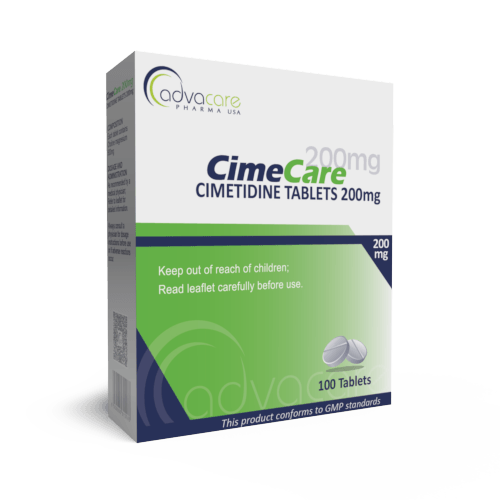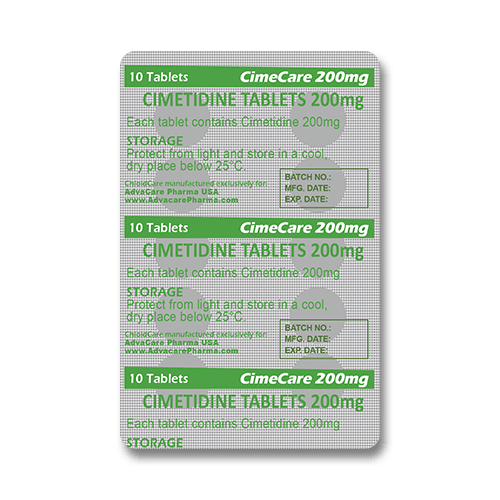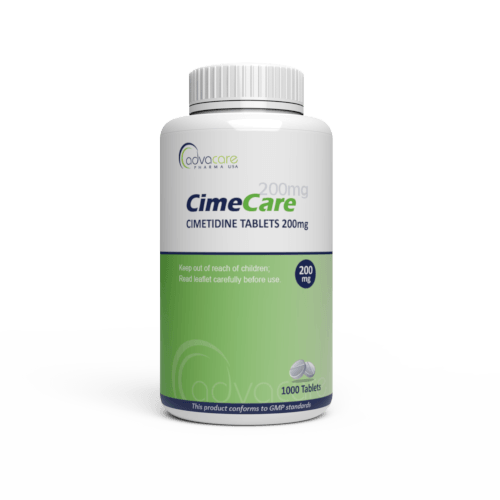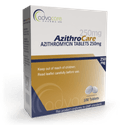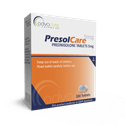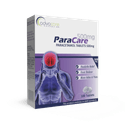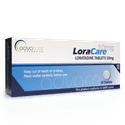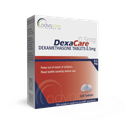- Home›
- Pharmaceuticals›
- Pharmaceutical Tablets›
- Cimetidine Tablets
Cimetidine Tablets
Dosage
Packaging
What is Cimetidine?
Active Ingredients: Cimetidine
Cimetidine Tablets are a drug used to decrease stomach acid production. It is indicated for the treatment of some stomach and throat conditions, like acid reflux disease and erosive esophagitis. It is effective in treating symptoms like stomach pain, heartburn, persistent cough, and trouble sleeping.
This medication is a commonly used gastric acid reducer, which may be used to treat and prevent ulcers and other stomach-acid-related damage. This medication is sometimes used to treat conditions such as stress ulcers, hives and pruritus, and viral warts. It may also be used to prevent acid aspiration during anesthesia or delivery.
Cimetidine is an antihistamine and antacid belonging to the class of drugs called H2 blockers. The active ingredient works by blocking histamine from the H2 receptors, which reduces the amount of acid that the stomach produces.
Cimetidine Tablets are produced with a dosage of 200 or 400mg. They are available packaged in a box containing blister packs or as a bottle of 1000 tablets.
AdvaCare is a GMP-certified producer of Cimetidine Tablets. This medication is manufactured in our factories in China, India, and the USA. We routinely inspect our production facilities to ensure our products meet quality and safety standards.
Why are we a leading Cimetidine manufacturer?
As a reputable Cimetidine manufacturer, we are dedicated to ensuring that GMP guidelines and standards strictly apply to the manufacture of our entire range of 200+ pharmaceutical treatments in tablet dosage form.
AdvaCare Pharma is an American pharmaceutical company committed to the manufacture of high-quality, affordable pharmaceuticals for a global market. The extensive international network that we partner with includes pharmaceutical distributors, hospitals, pharmacies, and a variety of other medical institutions. Our vision is to manufacture Cimetidine Tablets, and other quality-assured oral solid treatments, that get into the hands of those that need them most.
Uses
What is Cimetidine used for?
It is used to prevent and treat ulcers. It is also used to manage symptoms of stomach and throat (esophagus) conditions like gastroesophageal reflux disease (GERD), Zollinger-Ellison syndrome, and erosive esophagitis.
Cimetidine may also be used as prophylaxis for acid aspiration during labor or before general anesthesia. It may also be used in the treatment of pancreatic insufficiency, to reduce malabsorption due to short bowel syndrome, or to prevent stress-induced gastrointestinal bleeding in patients with severe illnesses.
How are Cimetidine Tablets used?
This medication is intended to be taken orally. It is typically taken at bedtime or with meals. When used to prevent heartburn, Cimetidine Tablets should be taken with a glass of water 30 minutes before eating or drinking. This drug should not be taken for longer than 2 weeks at a time unless directed by a doctor.
What dose should be taken?
Adult Dosing The recommended dosage may vary based on different medical conditions:
- For duodenal ulcer (active), the usual dose is 800mg taken at bedtime. The duration of treatment is 4-8 weeks. Alternatively, a dose of 1600mg can be taken at bedtime for 4 weeks; 400mg can be taken twice per day for 4-6 weeks; or 300mg can be taken 4 times per day for 4-6wk. The maximum dosage is 1600mg per day. Daytime doses should be taken with food.
- For duodenal ulcer (maintenance therapy), the usual dose is 400mg taken before bedtime.
- For gastric ulcer (active benign), the usual dose is 800mg taken at bedtime. The duration of treatment is 6 weeks. Alternatively, 300mg can be taken 4 times per day for 6 weeks. The maximum dose is 2400mg per day. Daytime doses should be taken with food.
- For GERD, the usual dose is 1600mg, divided and taken 2-3 per day. The duration of treatment is 12 weeks. Daytime doses should be taken with food.
- For Zollinger-Ellison syndrome and other hypersecretory conditions, the usual dose is 300-600mg, taken 4 times per day. The maximum dosage is 2400mg per day. Daytime doses should be taken with food.
- For prophylaxis of acid aspiration syndrome, the usual dose is 400mg. The dose should be given 90-120 minutes before the induction of anesthesia or at the start of labor. The dose may be repeated every 4 hours, as needed. The maximum dosage is 2.4g per day.
- For prophylaxis of stress-induced gastrointestinal hemorrhage, the usual dose is 200-400mg, taken every 4-6 hours.
- To reduce gastric acid during therapy with pancreatic enzymes, the usual dose is 800-1600mg per day. The dose should be divided and taken 4 times per day. It is recommended to take the tablets 60-90 minutes before meals.
- For dyspepsia, the usual dose is 200mg, taken 30 minutes before a meal. Do not exceed 14 days of self-treatment.
- For short bowel syndrome, the usual starting dose is 400mg, taken twice per day. The dose can be adjusted as needed.
Renal Dosing The recommendations for dose amount adjustments are as follows:
- CrCl 10-50ml/min: The usual dose should be decreased by 50%.
- CrCl < 10ml/min: The usual dose should be decreased by 75%.
- HD: The usual dose should be decreased by 75%. The dose should be administered after dialysis on dialysis days. No supplement is required.
- PD: The usual dose should be decreased by 75%. No supplement is required.
Hepatic Dosing Guidelines have not been defined for patients with hepatic impairment.
Pediatric Dosing For GERD or PUD (off-label), the usual doses are as follows:
- neonates: 5-10mg/kg per day, divided and taken every 8-12 hours
- infants: 10-20mg/kg per day, divided and taken every 6-12 hours
- children: 20-40mg/kg per day, divided and taken every 6 hours
Renal Dosing for pediatrics The recommendations for adjustments for children with renal impairment are as follows:
- CrCl 10-50ml/min: The usual dose should be decreased by 25%.
- CrCl < 10ml/min: The usual dose should be decreased by 50%.
- HD: The usual dose should be given every 12 hours. On dialysis days, the dose should be administered after dialysis. No supplement is required.
- PD: The usual dose should be given every 12 hours. No supplement is required.
Hepatic Dosing for pediatrics Guidelines have not been defined for children with hepatic impairment.
The dosage is based on medical condition, response to treatment, age, and weight. Refer to a doctor or pharmacist for guidelines on dosage. Do not exceed what they advise.
Who can use Cimetidine Tablets?
Cimetidine Tablets can be given to adults and children, but caution is advised for specific groups of patients.
Pregnant This drug may be used cautiously in pregnant women. Based on human data, there are no known risks of fetal harm. Animal studies have reported that this drug crosses the placenta, so it should only be used if there is a strong need. The use of any drug during pregnancy, particularly the first trimester, should be avoided if at all possible.
Breastfeeding Cimetidine should only be used cautiously in women who are breastfeeding. It is advised to weigh if the benefits outweigh the risks. It is known that Cimetidine passes into milk. Based on limited human data, there are no known risks of infant harm. Human data is not available to properly assess the effect of this medicine on milk production.
Children There are limited formal studies regarding the safety and efficacy of this medicine for pediatric patients. Though it is generally not recommended for children under 16 years old, reduced dosages are recommended for this population. Infants and neonates have been treated using this drug.
Geriatric There is limited data concerning the safety of the use of Cimetidine in the elderly population. It is important to note that this drug increases the risk of toxicity due to common drugs, and that its population has a higher risk of neuropsychiatric adverse effects.
How should Cimetidine Tablets be stored?
It is recommended to keep this medication in its original packaging until use. The tablets should be stored in a dry location below 25°C. Always keep medications such as this one out of the reach of children.
Other warnings
This medicine may produce antiandrogen effects and it has been associated with sexual dysfunction in males.
Side Effects
As with all pharmaceuticals, some unwanted effects can occur from the use of Cimetidine Tablets.
Common side effects include, but may not be limited to:
- dizziness
- headache
- drowsiness
- diarrhea
Stop using Cimetidine and contact a doctor if the following symptoms occur:
- bloody/tarry stools
- cough with blood or vomit resembling coffee grounds
- mood changes
- confusion or hallucinations
- breast swelling/ tenderness
For a comprehensive understanding of all potential side effects, consult a medical professional.
If any symptoms persist or worsen, or you notice any other symptoms, please call your doctor immediately.
Precautions
Do NOT use Cimetidine Tablets if:
- You are allergic or hypersensitive to cimetidine or any other ingredient in the tablet.
- You are hypersensitive to any other H2 receptor antagonists.
- You have certain kidney problems.
Due to possible drug interactions, consult with your doctor about any medications, supplements, or herbal products you are taking before your treatment. Modified dosages are alternative medications that may need to be considered. Cimetidine is known to interact with drugs such as ketoconazole, phenytoin, theophylline, certain antidepressants, blood thinners (e.g. warfarin), nifedipine, propranolol and sedatives such as chlordiazepoxide and diazepam. This is not a complete list of possible interactions. Cimetidine is contraindicated with medicines such as dofetilide, eliglustat, fezolinetant, lomitapide, and pimozide.
This medication may not be suitable for people with certain conditions, so it is important to consult with a doctor if you have any health conditions. Special considerations or additional monitoring may be necessary for those with conditions such as:
- liver impairment
- kidney impairment
- chronic pulmonary diseases
- diabetes mellitus
- immunocompromised state
- elderly or debilitated
- pregnancy or planning to become pregnant
- breastfeeding
Some formulations of cimetidine may contain lactose. It is advised to consult the packaging for a full list of inactive ingredients.
References
Effects of cimetidine on the healing and recurrence of duodenal ulcers and gastric ulcers
Cimetidine has been shown to aid in the healing and recurrence of duodenal and gastric ulcers.
This study revealed that cimetidine significantly promotes the healing of duodenal and gastric ulcers compared to a placebo.
The drug can reduce the recurrence of duodenal ulcers.
The findings from this study indicate that cimetidine reduces high gastric acid production, aids in the healing of duodenal and gastric ulcers, and helps prevent the recurrence of duodenal ulcers.

You might be interested in...
Why AdvaCare Pharma?
As an industry leader, we are aware of our responsibility to provide affordable and sustainable solutions to improve healthcare worldwide.
